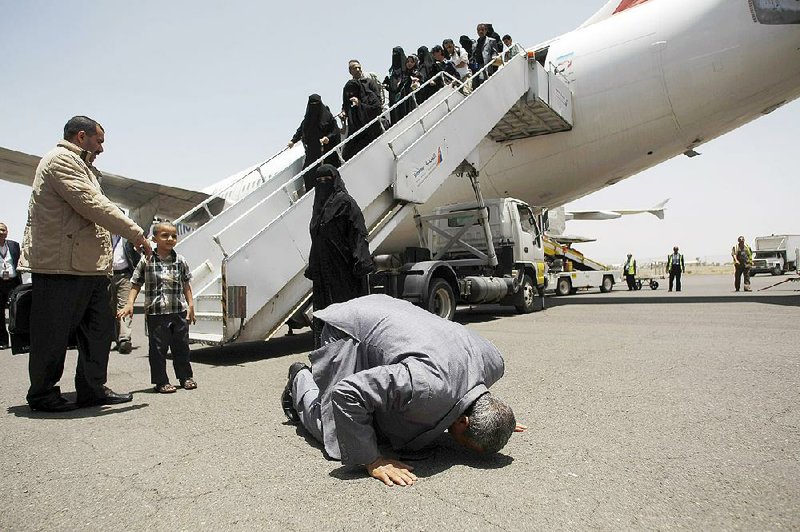SANAA, Yemen -- The United Nations set the date for peace talks on Yemen for next week in Geneva, and the Saudi-led coalition on Wednesday bombed Shiite rebels in at least five of the country's northern provinces.
It was not immediately clear who might represent the warring factions at the talks. The internationally recognized government of Yemeni President Abed-Rabbo Mansour Hadi, now in exile in Saudi Arabia, has demanded that the rebels, known as Houthis, first pull out of towns and cities, including the capital, Sanaa, which they captured in a power grab that started last year.
In a statement, the U.N. said it would host the talks in Switzerland starting next Thursday. U.N. Secretary-General Ban Ki-moon urged all parties to engage "without preconditions," stressing that the only way to resolve Yemen's conflict is an "inclusive, negotiated political settlement." A spokesman for Ban said he was to attend the start of the talks.
Yemen's U.N. ambassador, Khaled Alyemany, said Hadi's side and the Houthis will attend the Geneva talks, adding that the government will be represented at a high level, perhaps by the vice president.
But a top Hadi aide, speaking on condition of anonymity because he was not authorized to talk to the media, said the government would not give up its condition that the Houthis withdraw.
Alyemany said the Houthis appear to have reached the moment of "wanting to talk," though they showed no signs of wanting to "give up what they consider their expansions on the ground."
Western countries accuse Shiite power Iran of backing the Houthis, something the Islamic Republic and the rebels deny. Both the Yemeni ambassador and the Saudi ambassador to the U.N., Abdallah Al-Moualimi, ruled out Iran's participation in the Geneva meetings.
"There is no place for Iran in the consultations in Geneva," Al-Moualimi told reporters. "They have not been playing a constructive role and, as such, cannot be rewarded by having a seat at the table."
U.N. deputy spokesman Farhan Haq said the format of the Geneva talks was still being worked out. He said the U.N.'s envoy to Yemen, Ismail Ould Cheikh Ahmed, is to visit Tehran today for meetings about Yemen, but he did not give details.
Alyemany also said former Yemeni President Ali Abdullah Saleh and Houthi figures who are on a U.N. sanctions list will not participate in the talks. The U.N. has not listed who has been invited.
The U.N. Security Council this year imposed an arms embargo on Houthi leaders and on Saleh, who stepped down in early 2012 as part of the U.N.-guided transition. The Security Council also has demanded that the Houthis withdraw before any formal talks.
The rebels and their allies, Saleh loyalists, boycotted a gathering held in the Saudi capital, Riyadh, this week that was billed as a peace conference on Yemen.
Meanwhile, the Saudi-led coalition continued to pound the Houthis and their allies Wednesday in at least five northern provinces under rebel control, including Sanaa. In the western city of Ibb, warplanes struck a police commando camp run by Saleh loyalists, killing at least 12 and wounding 17, officials said.
In the port city of Aden, the rebels and their allies randomly shelled residential areas, killing one woman and wounding three.
The Houthis continued to retaliate for the Saudi-led attacks by engaging in clashes in the border area of Jizan on Wednesday and killing a Saudi soldier, the Saudi news site Sabq reported.
The Yemeni conflict has killed 1,820 people and wounded 7,330 since March 19, according to U.N. estimates, with nearly 500,000 people displaced through May 7.
International aid groups on Wednesday urged warring parties to agree to a cease-fire so humanitarian aid can be delivered, saying a five-day truce that was breached several times and expired this week was not enough.
"The amount of aid allowed in barely scratched the surface of the humanitarian catastrophe," said Grace Ommer, Oxfam's director for Yemen.
But the Saudi ambassador to the U.N. said any further humanitarian pauses will be a military decision and will be based on the situation on the ground, specifically "whether the Houthis are complying with such a pause."
Al-Moualimi said the previous cease-fire "was misused in a very blatant way" by the Houthis and their allies, though he acknowledged that progress was made in delivering aid to Yemen.
Also Wednesday, the U.N. said an Iranian ship carrying supplies is heading to Djibouti, the site of the U.N.'s hub for distributing aid to Yemen.
The ship, which raised concerns in the Saudi-led coalition, was originally reported to be heading to Yemen's Hodeida port, where it was to arrive today.
Earlier Wednesday, Iranian Deputy Foreign Minister Hossein Amir Abdollahian said Iran will abide by the U.N. protocol, which requires aid to be routed through Djibouti.
Information for this article was contributed by Edith M. Lederer and Ali Akbar Dareini of The Associated Press.
A Section on 05/21/2015

